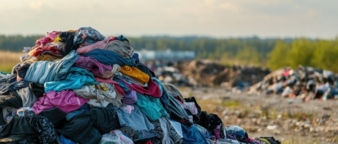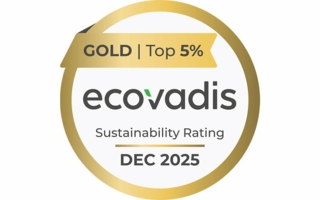18/09/2025 – Unfair, unethical, unsustainable, unstoppable?
Europe’s bipolar obsession with fast fashion
Cheap, fast and everywhere: Chinese ultrafast fashion giants Shein and Temu are flooding Europe with low-quality goods, dodging taxes, exploiting legal loopholes and undermining local businesses, ethics and the planet. How long will they keep flying under the radar?
Around the globe we have developed an unhealthy obsession with fast, cheap goods. While speed and price are certainly important factors for consumers in 2025, I am deeply troubled when I see Chinese fast fashion companies like Shein and Temu, overwhelming our European markets with derivative copycat creatives, ultra cheap, poor-quality and even more poorly sourced merchandise.
Fueled by billions dollar advertising budgets on social media, paid partnerships with superficial, vacuous “influencers” and (increasingly so) greed-driven mainstream media outlets looking for their own piece of the billion-dollar advertising spend, ultrafast fashion is flown in daily to each European country, taking advantage of non-existent labour and working rights in China and lax import duty regulations at our boarders. With almost instant gratification at unbeatable prices, the likes of Shein and Temu are intoxicating the Gen Z and Gen Alpha ager groups (in particular), while slowly squeezing the life out of our retail quarters and those locally owned and made European brands.
Unfair.
Disrupting traditional fast fashion players through its aggressive low-price strategy, large online presence, and fast production cycles, Shein & Temu’s increased market share is putting pressure on established retailers and brands who design in Europe, sell through store networks and provide hundreds of thousands of retail jobs across the continent, to adapt their practices impacting profitability, particularly amongst smaller businesses struggling to compete with such low prices. With a presence in over 150 countries, and over 100 million active monthly users in the European Union, its reach is considerable. Beyond reach, however, both seem to be leveraging some considerable tax gaps, making it even more challenging for local retails to compete on a level playing field. For example, Shein’s UK sales hit £1bn+, but the Chinese retailer pays just £2m tax. Shein and Temu have historically exploited a loophole that excludes low-value items from import duty. That is fast coming to an end as the EU plans to impose import duty on cheap goods, with the potential change coming amid growing disquiet among retailers based in mainland Europe, the UK and the US about rising competition from the Chinese-linked marketplaces – it cannot come soon enough.
Unsustainable.
Fashion manufacturing occurs in long and complex supply chains. From growing or extracting fibres and weaving or knitting textiles, to dyeing, finishing, cutting and sewing garments, the fast fashion business model is based on the frequent release of new collections at low prices. With a strong emphasis on reducing production costs and speed to market, suppliers face significant pressure to manufacture to tight deadlines and low margins, inevitably leading to a situation where corners are cut, and sustainability and environmental goals are effectively thrown out the window. In 2022, Shein announced the launch of its resale programme, an online peer-to-peer platform for U.S. consumers to buy and sell pre-owned products, but this was promptly met with accusations of greenwashing. Poor quality products end up (as we all know), a few weeks or months later as discarded textile mountains in landfill, or worse still in our suburbs or African beaches, thousands of miles from Europe and even further away from their point of origin in China, entirely justifying the tag of greenwashing. How can we not also mention the greenhouse gas emissions generated by the two Chinese giants? To ensure rapid deliveries to their customers, they rely heavily on air freight, which pollutes 20 to 30 times more than sea freight. According to a study carried out last year by Cargo Facts Consulting, Temu and Shein together ship around 9,000 tonnes of goods around the world every day - the equivalent of almost 90 Boeing 777 cargo planes. To put this into perspective, if these 9,000 tonnes were shipped to UK, this would represent more than 32,000 tonnes of CO2 per day.
Unethical.
Not only does the ultra-fast fashion business model generates huge volumes of greenhouse gases and textile waste. To compound the matter, there are no universal laws or regulations governing sustainability, making enforcing anything almost impossible. Following a British documentary on its practices, Shein announced that all its suppliers must follow its code of conduct based on International Labour Organization conventions and local laws and regulations. It further asserted that suppliers are audited by leading global audit agencies who had carried out more than 2,600 audits in the past 12 months. However, with over 6,000 suppliers, it is clear that not all are audited regularly, leading to questions about human rights. Its philanthropic initiative of setting up a five-year $50 million climate fund with $15 million going to The OR Foundation to tackle textile waste in Ghana was also criticised by researchers as “social offsetting”. Like carbon offsetting, critics feel the initiative does not tackle the root cause of the problem – in this case, the vast quantities of clothing being produced. Fundamentally, we need to slow down fashion cycles and produce fewer products. Not only should we consider the environmental cost of buying fast fashion, but also the human cost to the people who make our clothes.
Unpunished?
I have spent my entire working life helping the best brands in the world build efficient, resilient, traceable and responsible supply chains to give customers the best, most sustainably sourced and ethically manufactured products. This new wave of Chinese fast fashion is the result of a distortion and misappropriation of the use of supply chains and digital technology, and it’s something our societies and governments need to fight and stop. It threatens our economies, our brands, our citizens (both buyers and store associates), our ethics and our very environment.
How long will Temu and Shein continue to fly under the radar of our governments? As we’ve seen in the US recently, where there is political will, action can follow swiftly. Tik Tok, the clock is ticking on Chinese fast fashion in Europe.





